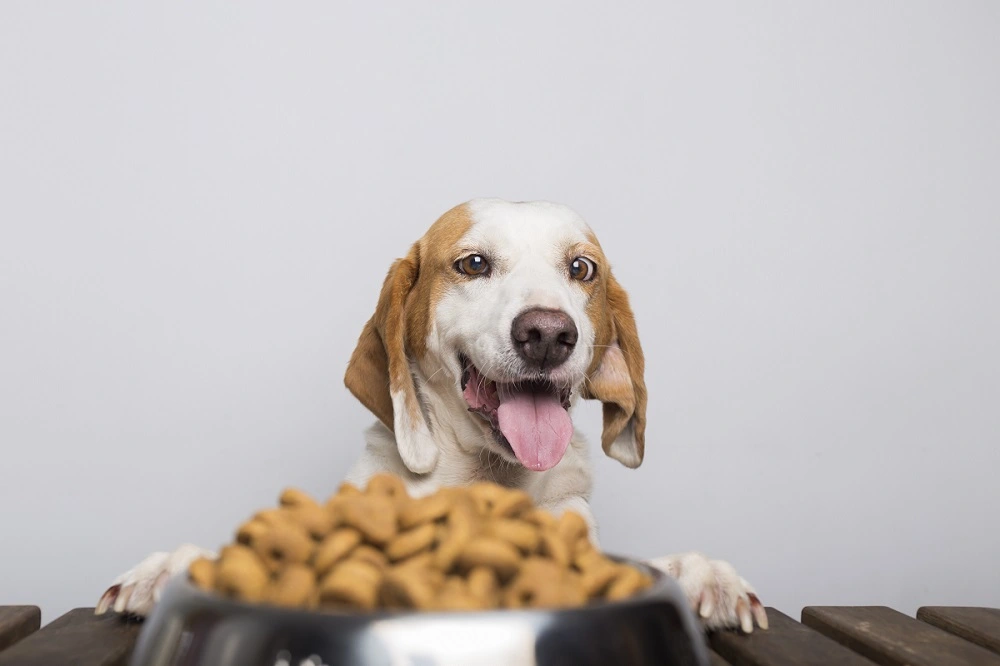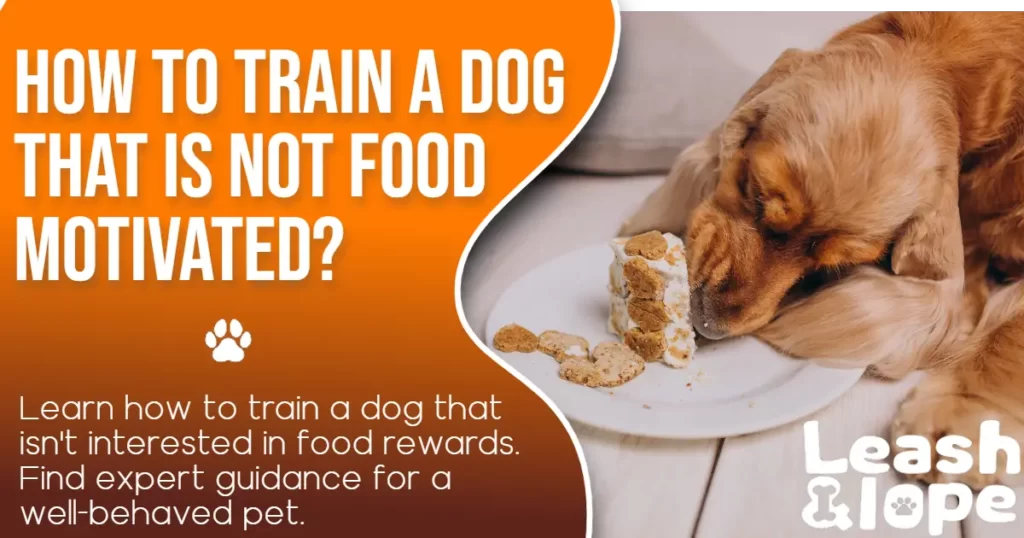My dog only sniffs the treats but does not eat them, sometimes eats but is not in an exciting way. These are the common problems that some pet owners have. Well if you are dealing with the same issues, hope this 5 – 7 minutes of reading is worthwhile.
Having a pet in the house comes with great happiness and responsibilities. A major responsibility is training them and, training is directly linked with the treats. For many pet owners, training takes time but, if you have a dog that is not food-motivated, the task can become irritating as you need to take one more step. as your dogs do not have any motivation for the training.
Remember, your dog is not doing the task becuase they like you, they are doing becuase they like treats, rewards.
However, don’t be upset! if you are dealing with such scenarios. as there is nothing such as an “Untrainable Dog” when it comes to dog training. Yes! it can take more time if you have a dog that is not motivated by the food.
Most dogs are trainable. There may be some dogs with brain disorders or injuries that find it hard to learn, but this is the exception – Dr Joanne Righetti
In this article, we’ll be talking about why your dog is not food-motivated. and, how you can train such dogs.
How Do You Know If Your Dog is Not Food Motivated?

you might be thinking, what kind of question this is? if my dog is not eating the food interestingly he/she is simply “not food motivated.” but, before labeling them “A nonfood motivated dog” try to change the treats.
A treat that motivates one dog may not motivate others as each dog has a different taste, so you need to do a treat test.
So coming back to the question “How Do You Know If Your Dog is Not Food Motivated” is by their response to each treat. A dog can typically do these things with the treats being offered.
- If your dog is sniffing it only but not eating, he/she is not interested in that food type at all.
- Some dogs make their head down or look away, to tell you that they are not interested in it.
- Although, if they eat it, it doesn’t mean they are motivated by this type of treat.
- Motivation towards dog treats shows differently. They show excitement like they want a full bag of it, excited to get more. They’ll start roaming around you to get more or keep looking at you.
We need to find a treat that motivates the dog the most. Your dog might be interested in chicken/meat or other expensive treats. and, kibbles and biscuits are not motivating them at all.
Is Dog Not Food Motivated Normal?
When someone says “My dog is not motivated by food.” they typically mean they are not motivated by “food treats” as a reward for their good behavior. However, dogs are naturally curious about food and slurp treats like they will not get another one.
But, if your dog is not showing interest in food treats at all, it can be a sign of something wrong. Sometimes, it’s just their breeds. Terriers, herders, and guardians breed prefer high-value treats. Sometimes, their stomach could be upset, maybe they are already full or need to change their treat’s flavor.
Try to change something, if nothing working at all then visit your vet, maybe your pet needs detail checking. Besides that, we have listed down 5 common reasons your dog is not food-motivated.
5 Reasons Your Dog Is Not Food Motivated

If your dog was eating the same pack of treats for a while but not eating now, try changing their treats, or switching to high-value treats, they might excite them. Research on what type of treats your dog breeds likes the most. but, if you feel your dog has a low desire for food overall, look for these reasons. these are the most common reasons your dog is not food-motivated.
- Check if your dog is healthy
- They have access to food all the time
- They are not hungry
- They Associate threats with the trap
- They Are distracted
1. Is Your Dog Healthy?
There could be several health conditions that can make your dog picky about food. you have to understand that either their overall diet affects or only the treats.
If there are overall diet effects and eating less than the last couple of days. it’s better to visit your vet. Your dog might have a fever, gastrointestinal issues, nausea, or dental issues. check if they are pooping properly. either popping or not, maybe they have constipation. Similarly, there could be several other reasons that can disturb a dog’s eating habits.
but, if they are eating well overall and only the treats part gets disturbed then there could be some other issues. If your dog aging they might be dealing with “conditioned taste aversion (C.T.A)” It’s a condition in which a dog associates a specific food with feeling sick. This happens when a dog eats something and then gets sick afterward. Their brain connects the taste of that food with feeling unwell, so they avoid it in the future to prevent getting sick again.
In short, it’s not possible to tell about a dog’s condition without checking him/her physically. so, if you notice any behavior changes in the dog, sleeping more, laziness any other, we’ll highly recommend to visit a vet first.
2. They Have Access to food All the Time.
If your dog has access to food all the time, their bowls are filled all the time, or they know where their food is. they can get it any time. why work hard for it?
This is one of the most common reasons behind “Dogs not Food Motivated” as they can get it anytime. Remember, when training a dog, use treats as a reward only. Otherwise, you are giving them a signal that you can have it anytime, you don’t have to work hard for it.
Related: How many treats a day for puppy training.
If it happens already, an easy solution would be to hide the treat pouch and not give it for a few days. let them forget about it, and make sure your dog has to work hard for it, if they listen to your command, give them a treat with a cheerful tone like “Good Job.” They’ll connect it to the treats with positive behavior.
3. Maybe They Are Not Hungry
It is directly connected with the point #2. If they have free access to food all the time and you are free feeding your dogs. It simply means your dog is not hungry at all.
Try to change their routine a bit. Give them small meals and use other small meals and use it as a treat during training. It’s a normal science that when your dog is hungry they’ll definitely get motivated towards food.
4. They Associate Treats With the Trap
If you’ve used treats to trick your dog into doing something they don’t like. They might be linking treats with the trap.
For example, If you use treats to lure your dog into a vet’s office and they have a painful experience there, like getting a shot, your dog might start avoiding treats in the future because they link treats to scary vet visits. Similarly, they do not want to get a bath, but you give them treats to come to the bathroom and bath them. Now, They connect the treat with some negativity and avoid it.
In order to solve this issue, introduce the even tastier treats (different from the ones they are scared of) and introduce them in a nice way. This way you are building trust with them. but, when your dog has started eating those super tasty treats. use them as a reward only in training.
5. Your Dog is Distracted
If your dog is eating a treat in a comfortable environment like in a calm drawing room but not eating when outside. it means they are distracted by the road sounds. and, distractions make them scared that’s why they are not motivated to eat anything.
Well, a solution to this is to not go outside directly. instead, break the process into chunks. first, put on the leash, give them a treat, then make a route towards the door, making sure your dog knows you are going outside. at the door, just open the little bit of the gate give a treat, then just open the half door, then 3 quarters of the gate, and then the full gate, praise them at every stage. Similarly, stay outside the house and gradually increase the duration.
How to Train a Dog That is Not Food Motivated?

- Ensure They are not hungry
- Get High-Value treats
- Use Toy as a treat
- Use Praise as a treat
- Make sure not thirsty
- Train in less distracting area
1. Ensure Your Dog is Hungry
This is one of the most common reasons for dogs not being food motivated, as they are already full. so, a solution would give them half a meal for breakfast and make chunks of the other half and use it as a treat.
2. Get High-Value Treats
All dogs do not prefer the same kind of treats. Some may be excited about biscuits and some want expensive treats like boiled chicken or cooked meat.
3. Use the Toy as a Treat
If your dog is not excited about food no matter what you’ve offered. worry not. you can use their favorite toys to encourage them.
Just like you’d offer a treat, hold your dog’s favorite toy. When they do what you want, reward them by playing their favorite game right away.
4. Use Praise As A treats
Some breeds are more interested in love instead of food. When your dog listens to your commands and behaves well, instead of food you can show them how happy you are with this behavior. and, the best part of this method is, it is free 🙂
Even though dogs dont our words, they definitely understand our emotions, tone of voice, and body language. to show love you can use lovely words belly rub, or scratch their head. You can combine this with a clicker, clicker, and positive reinforcement.
5. Make Sure Your Dog is Not Thirsty
Carry a dog water bottle during training sessions because a dry throat can be a reason for not accepting the treats. In summer, your dog needs water frequently. See tips for running with a dog in summer.
6. Train in a Less Distracting Area
Try to change the location from the busy park to a quiet place (if you can find them). Most of the time when we take them outside, they want to explore the world instead of focusing on the training.
Switching to a quiet place can help in removing distractions and focus on training.
When to See A Vet?
Well, dogs not eating sometimes is not a problem. Think about the street dogs are they having food 3 times a day? no, so dogs have a habit of staying without food. but if your dog is consistently not interested in food and this loss of appetite persists for more than 24-48 hours, it’s essential to consult with a veterinarian.
A sudden and prolonged lack of interest in food can be a sign of an underlying health issue or discomfort. It’s better to address any potential problems early to ensure your dog’s well-being.
Additionally, you should seek veterinary attention if your dog shows other concerning symptoms, such as vomiting, diarrhea, lethargy, weight loss, or any behavior changes. These could be indicators of a more significant health problem that needs prompt diagnosis and treatment.

